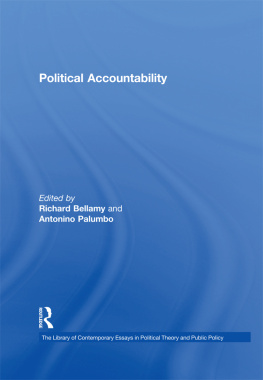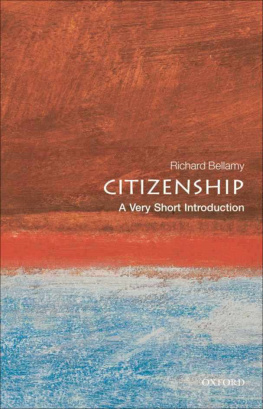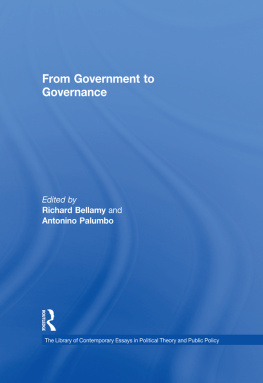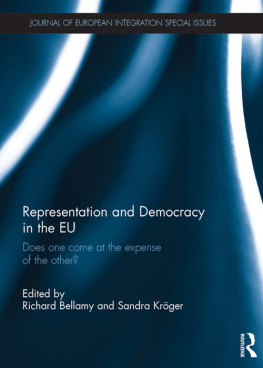First published 2010 by Ashgate Publishing
Published 2016 by Routledge
2 Park Square, Milton Park, Abingdon, Oxon OX14 4RN
711 Third Avenue, New York, NY 10017, USA
Routledge is an imprint of the Taylor & Francis Group, an informa business
Copyright Richard Bellamy and Antonino Palumbo 2010. For copyright of individual articles please refer to the Acknowledgements.
All rights reserved. No part of this book may be reprinted or reproduced or utilised in any form or by any electronic, mechanical, or other means, now known or hereafter invented, including photocopying and recording, or in any information storage or retrieval system, without permission in writing from the publishers.
Notice:
Product or corporate names may be trademarks or registered trademarks, and are used only for identification and explanation without intent to infringe.
Wherever possible, these reprints are made from a copy of the original printing, but these can themselves be of very variable quality. Whilst the publisher has made every effort to ensure the quality of the reprint, some variability may inevitably remain.
British Library Cataloguing in Publication Data
Political accountability. (Library of contemporary
essays in political theory and public policy)
1. Government accountability. 2. Democracy.
3. Representative government and representation.
I. Series II. Bellamy, Richard (Richard Paul) III. Palumbo,
Antonino.
320.011-dc22
Library of Congress Control Number: 2009935132
ISBN 9780754628064 (hbk)
The editor and publishers wish to thank the following for permission to use copyright material.
Cambridge University Press for the essays: Dennis F. Thompson (1980), Moral Responsibility of Public Officials: The Problem of Many Hands, American Political Science Review , , pp. 90516; Ruth W. Grant and Robert O. Keohane (2005), Accountability and Abuses of Power in World Politics, American Political Science Review , , pp. 2943.
European Journal of Sociology for the essay: Robert E. Goodin (2003), Democratic Accountability: The Distinctiveness of the Third Sector, European Journal of Sociology, , pp. 35996. Copyright 2003 A.E.S.
Indiana University Press for the essay: Anne-Marie Slaughter (2001), The Accountability of Government Networks, Indiana Journal of Global Legal Studies , , pp. 34767.
The Johns Hopkins University Press for the essay: Guillermo ODonnell (1998), Horizontal Accountability in New Democracies, Journal of Democracy , , pp. 11226. Copyright 1998 National Endowment for Democracy and the Johns Hopkins University Press.
New Left Review for the essay: Jurgen Habermas (2001), Why Europe Needs a Constitution, New Left Review, , pp. 526.
Wiley-Blackwell for the essays: Thomas Christiano (2004), The Authority of Democracy, Journal of Political Philosophy , , pp. 26690. Copyright 2004 Blackewll Publishing; Philip Pettit (2008), Three Conceptions of Democratic Control, Constellations , , pp. 4655. Copyright 2008 Philip Pettit; Arthur Isak Applbaum (1992), Democratic Legitimacy and Official Discretion, Philosophy and Public Affairs, 21, pp. 24074; Iris Marion Young (2004), Responsibility and Global Labor Justice, Journal of Political Philosophy , , pp. 36588. Copyright 2004 Blackwell Publishing; Kaare Stem (2000), Delegation and Accountability in Parliamentary Democracies, European Journal of Political Research , , pp. 26189. Copyright Kluwer Academic Publishers; Linda Deleon (1998), Accountability in a Reinvented Government, Public Administration , , pp. 53958. Copyright 1998 Blackwell Publishers Ltd; Colin Scott (2000), Accountability in the Regulatory State, Journal of Law and Society , , pp. 3860. Copyright 2000 Blackwell Publishers Ltd; David Held (2004), Democratic Accountability and Political Effectiveness from a Cosmopolitan Perspective, Government and Opposition , , pp. 36491. Copyright 2004 Government and Opposition, Ltd., Published by Blackwell Publishing; Joseph E. Stiglitz (2003), Democratizing the International Monetary Fund and the World Bank: Governance and Accountability, Governance , , pp. 11139. Copyright 2003 Blackwell Publishing; Alnoor Ebrahim (2003), Making Sense of Accountability: Conceptual Perspectives for Northern and Southern Nonprofits, Nonprofit Management and Leadership , , pp. 191 212. Copyright 2003 Wiley Periodicals, Inc.; Giandomenico Majone (1998), Europes Democratic Deficit: The Question of Standards, European Law Journal , , pp. 528. Copyright 1998 Blackwell Publishers Ltd; Andrew Moravcsik (2002), In Defence of the Democratic Deficit: Reassessing Legitimacy in the European Union, Journal of Common Market Studies , , pp. 60324. Copyright 2002 Blackwell Publishers Ltd; Richard Bellamy (2006), Still in Deficit: Rights, Regulation, and Democracy in the EU, European Law Journal , , pp. 7252. Copyright 2006 Richard Bellamy; Vivien A. Schmidt (2004), The European Union: Democratic Legitimacy in a Regional State?, Journal of Common Market Studies , , pp. 97597. Copyright 2004 Blackwell Publishing Ltd.
Every effort has been made to trace all the copyright holders, but if any have been inadvertently overlooked the publishers will be pleased to make the necessary arrangement at the first opportunity.
The normative appraisal of public policy both the process of policy-making and the substance of the policies themselves is becoming ever more salient for politicians, public officials, citizens and the academics who study them. On the one hand, the wider population is better informed than ever before about the activities of those that govern them and the consequences of their decisions. As societies have become more wealthy, so the expectations of citizens have grown and with it their tendency to criticise those who work on their behalf. On the other hand, though committed to the ideal of democracy, these same citizens have become ever more disillusioned with its actual working as a means for holding politicians and bureaucrats to account. In part, that disillusionment reflects the shift from government to governance both within and beyond the state, which has weakened or dispersed in complex ways the responsibility of politicians for many key areas of public policy. In part, it also reflects the desire for citizens for more individually tailored and particularistic forms of accountability that address their specific concerns rather than those of the collective welfare. As a result, a whole new machinery for standard setting and monitoring political behaviour has developed. The purpose of this series is to explore and assess the normative implications of this development, appraising the efficacy and legitimacy of the procedures and mechanisms used, and the outcomes they aim to achieve.
These issues lie at the heart of many of the most exciting new areas of research and teaching in moral and political philosophy, politics, international relations and public administration, and law and jurisprudence. The essays chosen reflect this disciplinary mix and the interdisciplinary work that has arisen in this area as a result. The volumes will be suitable for Masters and Professional courses in public policy, political theory and international relations; jurisprudence, international and public law; and applied ethics and political philosophy; as well as a useful resource for scholars doing research or those teaching in these areas.












